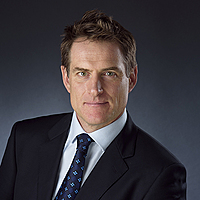The key characteristic this fundie looks for and 2 ASX stocks that fit the bill
According to Blackmore Capital’s Marcus Bogdan, “cycles are alive and well”. That was his initial comment when asked where the current conditions sit within his 30 years of experience.
“When I started 30 years ago, interest rates were in double digits. Inflation was at 6%. Since that time, inflation's gone down to 1-2% and interest rates have gone down to almost zero. And now they're recovering. We've got inflation around 6-7% and interest rates back at 3.85%.
Understanding investment cycles is critical. Where we are today, with the market on a PE of around 14.5x, a dividend yield of 4.4% - they’re around the 30 year average”.
Bogdan adds that the market is neither cheap, nor really expensive right now, but what is interesting is what’s happening underneath, i.e. what is going on at a sector level and with the companies that he wants to own.
.png)
In this wire, I pick Bogdan’s brain about the Blackmore strategy and exactly what he is looking for, his recent trip to Europe and the insights he was able to gather, how the portfolio is currently structured and some stocks that he likes, and what he thinks markets have in store over the next 12-24 months.
Resilience above all else
Above all else, Bogdan talks about being resilient when it comes to his approach, investment management, and the companies he owns. It's the common thread across all of those dimensions. As noted in the intro, Bodgan has been doing this for near on 30 years, and you don’t last that long without facing some rough periods.
“I think 30 years illustrates you have to be resilient. You have to survive through all of these different cycles.
And we've had a number of hundred-year floods in that 30-year period and virtually every decade, there is some significant event that has occurred, whether it was a recession when I started in the early '90s, the tech crash, the GFC, COVID”.
So, how does one stay resilient?
“What we do is own those companies that are able to generate revenue through those conditions, albeit slowing, but not so that their franchise is destroyed”.
More specifically, Bogdan looks to unlock ideas that are not well understood or telegraphed in the market and to do that, there is no substitute for hitting the pavement.
“Going out in the field, visiting companies and industry participants to really understand what those potential catalysts are and then valuing those catalysts. That's a core part of the process and that's where we try and add the most value”.
To put it in perspective, Bogdan himself attends between 200-300 meetings per year.
“There's 25 stocks in the portfolio. A lot of those are repeat meetings, but they're also building a knowledge base around those companies and those industries and researching them as wide as possible and getting as many different viewpoints is absolutely critical”.
Bogdan adds that by attending so many meetings, he can confirm his thesis or identify areas of concern.
“It's looking at the opportunity but then also trying to pick where there's cracks in the ice as well”.
Along with taking all those meetings, Bogdan identifies being suitably defensive as one of the key elements of his philosophy that creates resilience.
“The portfolio is probably more defensive. Howard Marks defines different types of investors. Some are aggressive, some are more defensive. The defensive investors tend to perform better in more challenging down markets and then try and participate as much as possible when markets are going higher”.
Bogdan adds that he and his team place an emphasis on earnings and balance sheet quality, and companies displaying such characteristics “tend to be less volatile”.
“Over the eight years that I've been running the fund, each of those periods where the market has fallen 10% or more, the portfolio has performed better than that, it's achieved lower volatility and has also recovered faster than the underlying market. It is definitely a characteristic of the portfolio”.
Getting into the nitty-gritty of the factors mentioned above, Bogdan zeroes in on operating margins and how companies perform through different cycles, and return on capital and a company’s ability to deliver.
Regarding balance sheet strength, Bogdan notes it is important because he wants to see companies that, when things do become more difficult, “can invest counter-cyclically, really take advantage of opportunities, and build a greater moat around their business”.
Insights from abroad
A recent trip to Europe saw Bogdan come back with two key insights that are helping to shape the portfolio currently.
The first insight Bogdan describes as “confirmational” regarding healthcare and, more specifically, “the significance of the backlog, the pressure on public hospitals, but also the recovery in base testing and elective surgery”.
The second insight was “understanding and appreciating the significance of the energy transition”. Whilst Bogdan readily admits that it has been topical for several years, Australian investors are not exposed to the transition in the same way European or even US investors are.
“The Inflation Reduction Act (IRA) (US) has been an absolute game changer in terms of the amount of capital that is going into that sector. That legislation has spending of around US$370 billion over the decade, coupled with a significant response from the private sector”.
The private sector response has been estimated to be around US$700 billion and Bogdan adds that prompted a very significant response from Europe because they want to continue to be able to attract capital and build green infrastructure there.
Where the rubber meets the road
Whilst the insights that Bogdan gathered were powerful, he runs an Australian equities fund, so he needs to be able to tie the insight back to an opportunity.
He believes there are multiple ways that investors can participate.
Bogdan notes that the oil and gas sector will be an important part of the transition. Specifically, companies like Santos (ASX: STO) and Woodside (ASX: WDS).
The next opportunity concerns green metals, i.e., “those metals that are benefiting from decarbonisation, and green infrastructure”. Bogdan adds that “we've got a great suite of companies here, whether it's BHP (ASX: BHP), Rio Tinto (ASX: RIO), Mineral Resources (ASX: MIN), Iluka (ASX: ILU), or a host of other companies that we can participate in directly”. There are also companies that will benefit from greater steel consumption, such as BlueScope Steel (ASX: BSL) and Sims Limited (ASX: SGM), because 80% of the IRA requires the use of steel.
The third opportunity involves participating in green infrastructure.
“Macquarie (ASX: MQG) is the centrepiece. They've shifted their business model from traditional infrastructure - roads, airports, ports - to being able to be a funder and a developer at world scale of green infrastructure. And when we do think that that trend is really at the nascent stages, and so they're a key beneficiary of that as well”.
Whilst those are the opportunities as Bogdan sees them, he has been hunting in the healthcare space of late, noting that some of the post-pandemic challenges are beginning to subside.
“Volumes were depressed, costs were higher, earnings were depressed. But more recently across the spectrum of healthcare companies, we have seen sequential improvement in operating conditions. Higher volumes, some of the cost pressures are now starting to come out and hence improving the earnings profile for those companies. That will be our number one industry that we're most attracted to at the moment”.
Bogdan nominates CSL Limited (ASX: CSL) as one of his preferred stocks in the space, but is a buyer closer to $270-280 rather than the current $310. He adds that he expects “that over the forecast period, CSL can grow at 10% plus or more, and hence believe that there is a value proposition in CSL at the moment”.
The stock Bogdan really likes in the space, however, is Integral Diagnostics (ASX: IDX) which is a radiology imaging company with a market cap of just under $800 million. Like CSL, Bogdan notes it was badly affected by Covid, with soft earnings and rising costs.
“More recently, we've seen a sequential improvement in both volumes and margin improvement, and we expect that those trends will continue”.
Bogdan adds that there is a trend towards more complex, higher-value testing, there is a backlog of patients to be serviced, elective surgery is returning, and the recent Federal Budget provided support for greater visitations to GPs – all tailwinds for IDX.
Another company that Bogdan likes is industrial Cleanaway Waste Management (ASX: CWY), Australia's largest waste management company.
CWY also had a rough 2022 with a flood and fire destroying some key infrastructure for the group. But CWY “is now starting to see better, more normalised operating conditions. They're starting to see a recovery in volumes and an uplift in operating margins”.
Bogdan also likes the investments CWY is making through being vertically integrated and adding value through the waste management cycle. “Really important green infrastructure they're building within that company as well. That's a good long-term investment theme coupled with a recovery in earnings”.
Looking ahead
In casting his mind forward, Bogdan notes that to this point, “the economy and company earnings have been far more resilient than feared”.
He adds that the last half-yearly and quarterly results were slightly better than expected, which he sees as a function of close to full employment, and migration returning at record levels. “They're really important ballasts for the economy”.
Bogdan is also mindful of the impact of higher rates, however, and the coming mortgage cliff when homeowners roll from fixed to variable.
“The net result of that is that we expect that we won't be going into a significant slowdown, but there is definitely a slowdown there in the trajectory of earnings. But for the foreseeable future - the next six to nine months - we still expect earnings to grow but at low single digits”.
“We expect to see some further recovery and M&A activity. Looking at all of that, we expect markets be slightly higher to sideways over the next six to 12 months”.
Whatever the outcome, Bogdan is sure to remain resilient.
Long term investors, not speculators
With over 25 years’ experience of being dependable custodians of investor capital, Blackmore Capital has navigated through a myriad of market cycles and delivered capital accretion by applying our time-tested investment framework with relentless discipline.
Learn more about investment solutions at Blackmore's website.
2 topics
12 stocks mentioned
1 contributor mentioned



